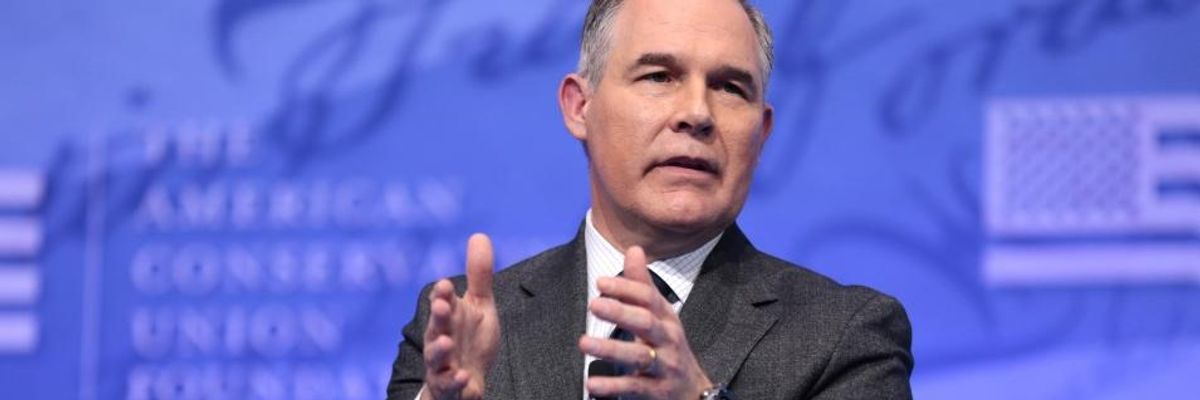After more than a year of aggressively lobbying the Trump administration to gut Obama-era fuel efficiency standards aimed at reducing greenhouse gas emmissions, automakers are poised to finally have their wish granted on Sunday, when EPA chief Scott Pruitt is scheduled to officially declare the rules "not appropriate."
"The current iteration of fuel standards are based on sound science, which the EPA should be using to make its decision--not pressure from the auto industry."
--Natalie Nava, Greenpeace USAAs Reutersreports, Pruitt is then planning to deliver a speech on Tuesday celebrating the regulatory rollback from a Chevrolet dealership in Virginia--a fitting location, given that representatives of Chevrolet's parent company General Motors met with Pruitt frequently last year to demand less stringent fuel standards.
Bill McKibben, founder of 350.org, argued that Pruitt's plan to lower emissions standards "ranks high among the stupidest policies yet proposed" by the Trump administration.
"Weakening clean car standards is bad for the planet, public health, and the auto industry itself. Ford Motor Company and other automakers...have been actively fighting the clean car standards and have been instrumental in pushing for this development," Natalie Nava, project leader at Greenpeace USA, added in a statement on Thursday. "The current iteration of fuel standards are based on sound science, which the EPA should be using to make its decision--not pressure from the auto industry."
In a tweet on Friday, Public Citizen similarly accused the EPA of "pandering to auto executives and their Washington lobbyists."
While it is not yet known what specific changes Pruitt plans to make to current fuel efficiency standards, states and environmental groups are already gearing up to challenge what is expected to be a significant rollback in court. Under the current rules, put in place in 2012, automakers would be required to "nearly double the average fuel economy of new cars and trucks to 54.5 miles per gallon by 2025," the New York Timesexplains.
California Attorney General Xavier Becerra led the opposition to Pruitt's rule changes on Friday, declaring: "California is prepared to take any steps necessary to protect our planet and people."
Though companies like Ford and General Motors have publicly expressed their "commitment to sustainability," Sierra Club's Gina Coplon-Newfield argued in a series of tweets on Thursday that their relentless push for weaker efficiency standards exposes the shallowness of their pro-environment rhetoric.
"The clean car standards can limit global warming pollution by six billion tons, save consumers $1.7 trillion dollars in fuel costs, and reduce oil consumption by up to four million barrels every day," Coplon-Newfield observed. "Ford has been working with Scott Pruitt and Donald Trump to roll these standards back to pollute our communities and increase what people pay at the pump."
